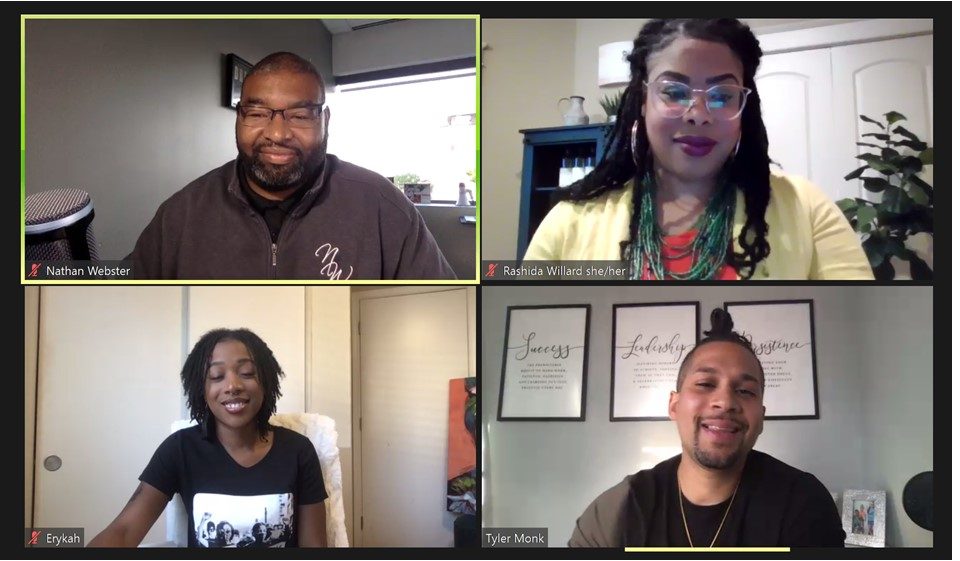Sharing their stories

Two members of the Clark College community shared their experiences of being Black in Vancouver during a public online event held on July 30. Vice President of Diversity, Equity and Inclusion Rashida Willard and marketing professor Nathan Webster were among four speakers who told their stories during “Listen to Learn & Lead: Stories from our Black Community.”
The event was co-presented by VanTalks, Vancouver’s version of TED Talks that inspire change, ideas and innovation, and by Ready to Rise, which supports students of color and first-generation college students.
The other two featured speakers were Tyler Monk, Clark County director of Ready to Rise, and Erykah Weems, who grew up in Vancouver and recently graduated from Central Washington University. She is passionate about supporting and elevating the voices of girls and young women of color who have been impacted by adverse childhood experiences.
At the start of the forum, emcee Monk reminded the audience: “We have four Black folks sharing our experience. We do not speak for all Black folks.”
Nathan Webster
Webster, who grew up in Vancouver and graduated from Mountain View High School, talked about how it felt growing up in a sea of white people. During his presentation, he shared class photos in which he is the only Black person.
“I’ve always been that ink spot in that bottle of milk,” he said. “I don’t see enough Black males in leadership roles in Vancouver. Can we show some love to our Black males? So many of my students at Clark have never had a Black male teacher until they took my class.”
Webster also addressed how he feels being a Black male during an era when police brutality toward Black males is rampant. Too often, white people encounter a law-abiding Black male who is doing nothing illegal and minding his own business, but the white person calls the police.
He said, “White folks, please don’t be scared of Black men. I don’t want to be an endangered species.”
Rashida Willard
Willard says she grew up in pre-gentrified Northeast Portland in a close-knit Black community that included “cookouts, church ladies and aunties sitting on the porch watching out.” Later, she and her husband and their growing family were priced out of their Portland community. After moving to Vancouver, where housing prices were more affordable, she started looking around for other Blacks and asked herself: “Where are they?”
Willard spoke about the need to pay attention to her actions and words in Vancouver’s stores, medical offices, restaurants and her workplace. She talked out her internal monologue when she’s in a store: Keep your hands out of your pockets or people will think you’re stealing. Her list of “don’ts” was long and included paying attention to her clothing and hair.
She told a story about a time she was grocery shopping when a white stranger asked her to control her child. The woman was pointing to someone else’s Black child.
She told the audience, “I don’t own all the Black kids in Vancouver!”
On another trip to the grocery store, the cashier asked Willard whether she was going to use her EBT card to pay for her groceries. Willard told the audience that she doubted the cashier asked white shoppers that same question.
After many negative encounters in Vancouver, she said, “I started to wonder where I belong.”
She spoke about the need for more local leaders who are not white: “In Vancouver students need to see people of color in leadership positions.”
During the Q&A after the presentations, an audience member asked: What’s the biggest mistake white allies make?
Willard answered: “Be an ally when the cameras aren’t rolling. True allyship is what you are doing when nobody is watching.”
She added, “If you’re a white person called out by a person of color, listen to them. Believe Black folks.”
The event is viewable on the VanTalks YouTube channel.